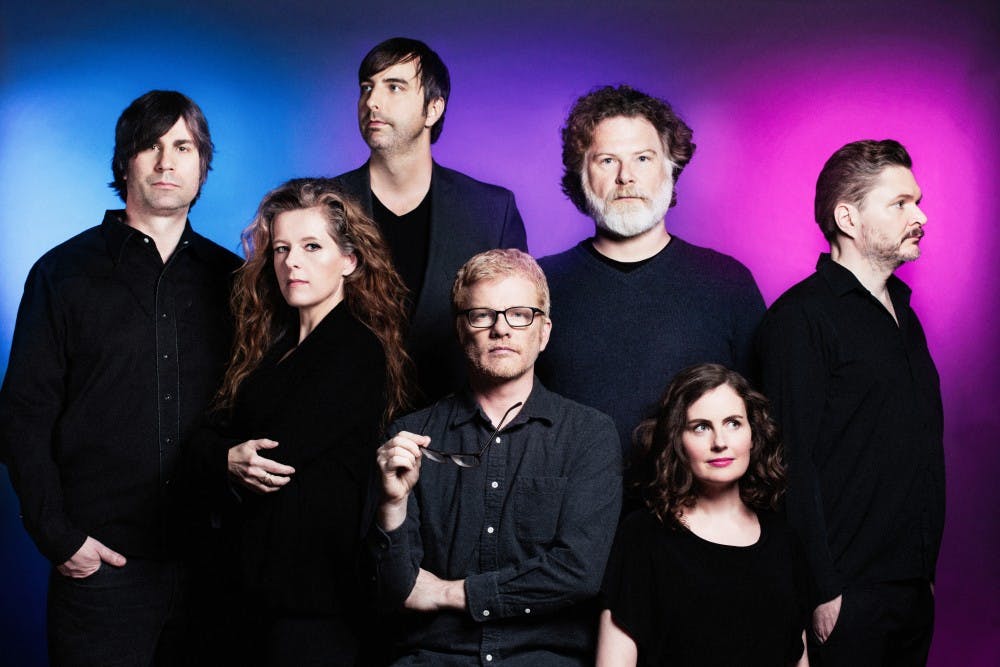The New Pornographers play at Raleigh's Lincoln Theatre May 1, fresh off the release of their seventh album “Whiteout Conditions.” It’s the first album by the indie group to be written entirely by frontman Carl Newman, and it’s also the first without Dan Bejar, lead singer of Destroyer. The Chronicle talked to Newman about the new record and the political climate that influenced it. The following interview has been edited and condensed for clarity.
The Chronicle: “Whiteout Conditions” was the first album to be written entirely by you. Can you describe how the creative process was different than your previous records?
Carl Newman: Oddly enough, it wasn’t that different on my side, because Dan [Bejar] never worked on my songs. So in terms of me sitting in the studio working on songs, nothing changed. It didn’t have that element where Dan would come in and be working on his songs. That was the difference, but for me actively making this record, the process was almost identical to any other record.
TC: In a statement about the album, you mentioned that the record was the band’s “mutated idea of krautrock.” It definitely has a more driving, electronic-driven sound than any of the previous records. What influenced that sound?
CN: It was more the idea of krautrock than anything. One record we went to a few times was “Crazy Rhythms” by The Feelies. I love the percussive attack of that—I love the jittery, laid-back speed of it. That’s something we definitely went for as a reference point.
TC: Most people probably don’t think of New Pornographers as a political band, but songs like “High Ticket Attractions” touch on fears of climate change and apocalypse. You’ve also been a pretty vocal critic of President Trump on Twitter. How did the political climate influence the recording of “Whiteout Conditions”?
CN: That stuff snuck into the album whether I wanted it to or not, because that was 2016. You couldn’t be alive in America or even on Earth in 2016 and not be concerned about where we were going. It just snuck in. There was never any conscious idea of it—“Oh, we gotta say something here”—it just comes out of you accidentally.
TC: On the surface, to me, it sounds like a bright, energetic album, but there’s this sense of wound-up anxiety underneath.
CN: Yeah, I think that’s definitely a theme that runs through the record. It runs through a lot of our work. It’s like music as a form of escape—music as a form of redemption from things like anxiety over the world or personal anxiety.
TC: Is that something that fed into your other albums as well? How was that different for “Whiteout Conditions”?
CN: I think that is a theme that’s run through a lot of our records. Our songs, musically, have always been very upbeat, but then you listen to the lyrics and read the lyrics, and realize that, oh, it’s a little darker. That comes from the way I’ve always used music as an escape—not as something you listen to but also as something you make. I think most artists probably feel that way: you create. You create something to get something out of you that needs to be removed.
TC: To what extent, if any, can pop music be a vehicle for progress as opposed to just an escape or outlet for that anxiety?
CN: It depends on what you call “pop music.” Hip hop is technically pop music, and that seems like music that can be very political in a great way. The kind of pop music we make, I don’t know if it lends itself to being hard-hitting political commentary just because of the medium—just because I’m a big fan of melody and harmony, and songs with a lot of melody and harmony aren’t sufficient hard-hitting political songs. But I think there’s also something at the heart of it, though, of just going out there being an artist as a political statement. Or going out there and being a band that has women and men playing together. There’s little things that are subtle political statements, especially in today’s world. Maybe to us they don’t seem like political statements at all, but…
TC: The word “supergroup” gets thrown around a lot with the New Pornographers. Do you think that’s still an accurate label, and was it ever?
CN: I don’t think it really was at the beginning, but I guess it is now. I don’t know—we’ve just become a band on our own. I don’t see us as a supergroup, I just see us as a band, and it never seemed strange to me that a person would be in another band. I feel like anybody who comes up in any music scene, they usually play in a couple bands and don’t really think much about it. But people can call us whatever they want.
TC: What’s your earliest memory of music having an impact on you?
CN: I remember being a little kid and watching Monkees reruns. I think that had a big impact on me. I think they showed it everyday and every day would have one or two songs in it. When I think back, that left an impression on me.
Get The Chronicle straight to your inbox
Signup for our weekly newsletter. Cancel at any time.

